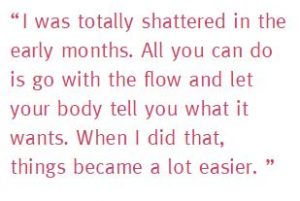The hormonal changes sweeping through your body when you’re pregnant can result in extreme tiredness during the first and third trimesters (morning sickness and looking after older children you may have won’t help either). Tiredness doesn’t harm your baby, but you will want to try and get as much rest as you can.
Why am I so tired?
Tiredness is one of the early signs of pregnancy for many women, and as you might have guessed, it takes feeling tired to a whole new level of intensity. As with normal sleep deprivation, pregnancy tiredness hits as part of a package deal – so you’ll also be feeling sluggish, run-down and generally low.
It’s often this sudden onset of incredible and seemingly inexplicable tiredness combined with nausea that makes many women ask themselves, ‘Am I pregnant?’ As horrid as this all sounds, you can rest (if you’re lucky) assured that feeling tired won’t harm you or your baby – though of course being this exhausted can make life much more difficult.
In addition to aches and pains, needing to wee more, and the lumbering weight of your belly, it’s possible that your sleep may be disturbed by strange dreams or nightmares about labour, childbirth and babies. This is nothing to worry about and very common during pregnancy. However, if it’s causing you anxiety, talking to someone and seeking advice or support, or practising relaxation and breathing techniques may help.

Pregnancy tiredness during each stage of pregnancy
Tiredness in the first trimester
Your body is working overtime – and you will really feel the effects of this in the first trimester, or until you are 12 weeks pregnant. It turns out that preparing a life-support system for a baby (aka the placenta) requires quite a bit of energy. This is likely to be exacerbated by an increased metabolism combined with lower blood sugar and blood pressure.
You’ll be wanting plenty of early nights and looking for any opportunity to squeeze in a daytime nap – but if you haven’t yet made a pregnancy announcement and shared your news with your nearest and dearest, you’re not going to get the sort of sympathy you’ll receive when you’re knackered in the last trimester. This might not go down well with the (perfectly normal) emotional instability you might be experiencing. Cue: extra exhaustion. Eesh. You’ll probably feel extra zonked around week nine.
Tiredness in the second trimester
Don’t worry, you’re not likely to be in for nine months of matchsticks in eyes. The second trimester should be better – most women report feeling less tired and having more energy in the middle stage of pregnancy.

Tiredness in the third trimester
In case you’d almost forgotten just how tired it’s possible to feel, pregnancy tiredness often returns with a vengeance around the time you hit being 28 weeks pregnant. No wonder, considering that at this stage, your baby is growing at a truly speedy rate – zapping you of your energy reserves in the process.
Could my tiredness be a symptom of something else, or harm my baby?
Feeling much more tired than normal is to be expected during pregnancy, and as such is almost always nothing to – ahem – lose sleep over. Occasionally though, tiredness – combined with other symptoms – can be a sign of something else. Visit your GP if any of the following apply to you:
- Your tiredness is routinely accompanied by symptoms of depression such as feeling very disconnected, hopeless or listless
- Your tiredness is constant, and you’re experiencing shortness of breath – you could be suffering from anaemia
- Your tiredness is extreme; some women have pregnancy insomnia, which can lead to exhaustion, which is more serious than general tiredness
Natural remedies for pregnancy tiredness
- It sounds obvious, but do rest as much as you can, accept all the help you’re offered, and look after your general health
- Try out a pregnancy pillow and different sleeping positions – different ones work for different women at different stages of pregnancy
- Before you even try to get to sleep, take some time to relax in a way that works for you – for example, antenatal classes may teach breathing techniques
- You probably won’t feel like it, but regular, gentle exercise can help beat tiredness – we’re not talking marathon running, but you could try something low-impact like pregnancy yoga, swimming or walking
- If sleeplessness is worrying you, seek support from your loved ones or medical professionals
What you should be eating to combat pregnancy fatigue
What you eat can affect your energy levels, so make sure you’re getting enough:
- Iron-rich foods, such as leafy green vegetables, red meat, eggs, sardines and beans
- Slow-release, fibre-rich foods such as wholegrain cereals, brown bread and brown rice (also good for combating constipation)
- Protein
- Vitamin C – it aids the absorption of iron
- Water

Sugary food and drinks and caffeine shots are a tempting pick-me-up when you’re feeling exhausted, but excessive sugar consumption will lead to spikes and crashes which can make you feel even worse, and the tannin in tea and coffee prevents your body from absorbing iron, and iron deficiency causes fatigue – so it’s a vicious cycle. Laying off too much caffeine is recommended (stick to 200mg a day) as it can affect your baby’s growth. Here are a few more tips on things to try and avoid during pregnancy.

What if I can’t sleep?
Insomnia in pregnancy is all too common and is horrible to cope with – particularly when you’re knackered to start with. Don’t worry too much if you find your sleep cycle is all out of whack; it’s important to rest as and when you can. You could try cutting down on caffeine and sugar, and try some gentle exercise or relaxation techniques before bed, but if you’re really concerned, do speak to your doctor.
Pregnancy tiredness at work

Being very tired at work is ‘workable’ for a little while, but if you’re feeling shattered every day, it can really lessen your resolve – and ability – to do your job.
Use whatever coping strategies you have in your battalion (resting during your lunch break, an energising diet, and so on), but also know that your employer is required to help. You have a number of legal rights during pregnancy, ensuring paid time off for antenatal care, maternity leave, maternity pay or maternity allowance and protection against unfair treatment, discrimination or dismissal.
Your employer should also make reasonable adjustments for you, and be open to discussing flexible hours or working from home.
Strategies for managing pregnancy tiredness
“I recommend eating lots of fruit and slow-releasing carbohydrates like pasta and rice. Chocolate is good for energy but the effect doesn’t last long.”
“I felt knackered for the whole of my pregnancy, and just had to take it as easy as possible, which was difficult with a toddler. I think that as long as your doctor says everything’s fine, you just have to rest as much as you can and accept that this is how pregnancy is.”
“Things I found helped were: muesli in the morning (combine 1/2-cup rolled oats with milk or fruit juice the night before and put it in the fridge, eat with fresh fruit, sultanas etc); exercise after breakfast, even when you’re feeling very tired, just a short walk to the park or something; a short sleep at lunchtime (or whenever your toddler, if you have one, sleeps) – but only around 40 minutes.”






